The 2M Alliance, comprising Maersk Line and MSC, has confirmed that the Port of Liverpool will become a permanent call on its TA4 service connecting Europe with several U.S ports. The move follows the introduction of a temporary call in July 2018 resulting from continued disruption at the Port of Felixstowe. The service will use a port rotation that takes in Antwerp, Rotterdam, Bremerhaven, Liverpool, Newark, Savannah, Port Everglades and North Charleston.
APL announced on 16th January that it is adding Guayaquil and Ensenada as ports of call to the Condor Express (CDX) service. The refined CDX service is characterised by its competitive transit time. Transit time from Guayaquil to Yokohama is 26 days, the fastest in the market. Cargo from Ensenada to Yokohama, Busan and China now takes 13, 16 and 21 days respectively. The improved CDX service commenced from Kaohsiung on 23rd January with the following port rotation: Kaohsiung-Hong Kong-Shekou-Ningbo-Shanghai-Busan-Manzanillo, MX-Lazaro Cardenas-Buenaventura-Callao-Guayaquil-Lazaro Cardenas-Manzanillo-MX-Ensenada-Yokohama-Busan-Kaohsiung. Five days later APL announced the launch of a new weekly service, the China Malaysia Service (CMS) to connect North, Central and South China to the niche ports of Port Klang, Penang and Pasir Gudang in Malaysia. The CMS commenced from Qingdao on 23rd February serving Qingdao, Shanghai, Xiamen, Nansha, Port Klang, Penang, Port Klang, Pasir Gudang, Shekou and Hong Kong. As part of the CMA CGM Group, APL will offer a total of 34 service loops in the OCEAN Alliance Day 3 Product from 1st April 2019 as follows: Asia-North America: 15 OCEAN Alliance services and 8 non-OCEAN Alliance services; Asia-Europe: 7 OCEAN Alliance services and 2 non-OCEAN Alliance services; Asia-Mediterranean: 4 OCEAN Alliance services and 1 non-OCEAN Alliance service; Trans-Atlantic: 2 OCEAN Alliance services and 3 non-OCEAN Alliance services: Asia-Middle East: 4 OCEAN Alliance services and 1 non-OCEAN Alliance service: Asia-Red Sea: 2 OCEAN Alliance services: Intra-Asia: 47 non-OCEAN Alliance services and Latin America: 21 non-OCEAN Alliance services.
CMA CGM announced in January that the PAD service linking North Europe with USEC, French Pacific islands, Australia and New Zealand would resume with a weekly frequency from mid-February.
The first sailing from Le Havre was handled by the 26,582gt/2001 built EM Corfu on 23rd February and likewise from Tauranga, New Zealand, on 16th April. The port rotation is as follows: Zeebrugge-London Gateway-Rotterdam-Dunkirk-Le Havre-New York-Savannah-Cartagena-Papeete-Noumea-Brisbane-Sydney-Melbourne-Nelson-Tauranga-Manzanillo-Savannah-Philadelphia-Zeebrugge. The service will be operated with 13 vessels of 2,500 TEU nominal capacity, with 600 reefer plugs. CMA CGM is deploying 12 of the vessels and the port of Napier will be offered via an Oceania feeder service. On 16th January CMA CGM unveiled its new unrivalled service, the Ocean Alliance Day 3 Product in partnership with COSCO Shipping, Evergreen and OOCL, that will commence in April. The new agreement will employ around 330 container ships, 111 of which will be operated by the CMA CGM Group, which handles 38 of the Ocean Alliance services, with an approximate carrying capacity of 3.8 million TEUs. The following day CMA CGM revealed that an updated rotation was to be implemented on the ACSA 1 service linking the Far East to the West Coast of South America. The revised rotation is: Yokohama-Pusan-Kaohsiung-Hong Kong-Shekou-Ningbo-Shanghai-Pusan-Manzanillo, Mx-Lazaro Cardenas-Buenaventura-Callao-Guayaquil-Lazaro Cardenas-Manzanillo, Mx-Ensenada. The first eastbound sailing was operated by the 95,256gt/2018 built CMA CGM Estelle from Kaohsiung on 23rd January and likewise from Buenaventura on 26th February.
The port rotation of the EURAF 4 and EURAF 5 services were also revised from February 2019 to improve services to Douala and Libreville. EURAF 4 is now dedicated to Cameroon with transit time improvements of up to 3 days. The revisions were effective from 8th February at Valencia using the 37,113gt/2000 built Carolina Star. Meanwhile, Libreville has transferred from EURAF 4 to EURAF 5, effective from 30th January at Antwerp with the call of the 40,542gt/2010 built NileDutch Okapi. The EURAF4 port rotation is now Valencia-Algeciras-Tangier-Lome-Cotonou-Bata-Malabo-Kribi-Douala-Valencia and the EURAF5 rotation is Antwerp-Le Havre-Lisbon-Algeciras-Pointe Noire-Luanda-Libreville-Kribi-Algeciras-Antwerp.
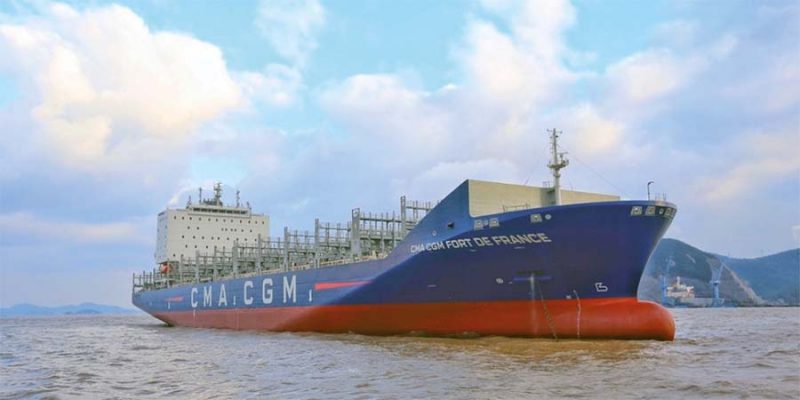
On 11th January came the news that CMA CGM had taken delivery of the first ship of an order for four container vessels dedicated to the French West Indies, the 36,946gt/2019 built CMA CGM Fort de France (above). With a capacity of 3,500 TEUs and a length of 219m, the new ship has a draught adapted to the West Indies ports. The remaining units will be christened CMA CGM Fort Royal, the CMA CGM Fort Saint Charles and CMA CGM Fort Fleur D’Epee.
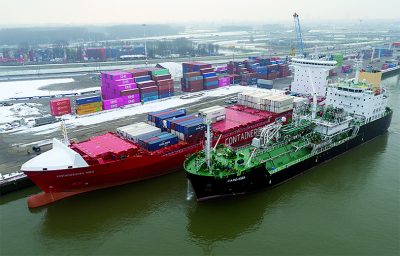
Containerships Group of Finland completed the first LNG bunkering operation at Rotterdam on 24th January involving 17,982gt/2018 built newbuild Containerships Nord ahead of her maiden voyage. Around 240mt of LNG fuel was loaded onto the vessel during a ship-to-ship transfer from Shell’s specialised 9,816gt/2017 built LNG bunkering vessel Cardissa (above). The Containerships Nord embarked on her delivery voyage from China to Europe in mid-December.
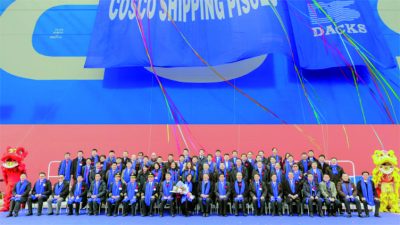
COSCO Shipping’s 196,670gt/2019 built COSCO Shipping Pisces (above) was named on 11th January at her builder’s, Dalian Cosco Kawasaki Shipbuilding (DACKS). The 20,000 TEU capacity ship is 400m long with a beam of 58.6m and a design speed of 22.5 knots. After delivery, the COSCO Shipping Pisces was deployed to the Constellation Express route, providing service between Europe and Asia on the AEU7 Eastbound route. The ship is the second of COSCO Shipping’s Constellation series of vessels, all named after the 12 constellations in the zodiac family.
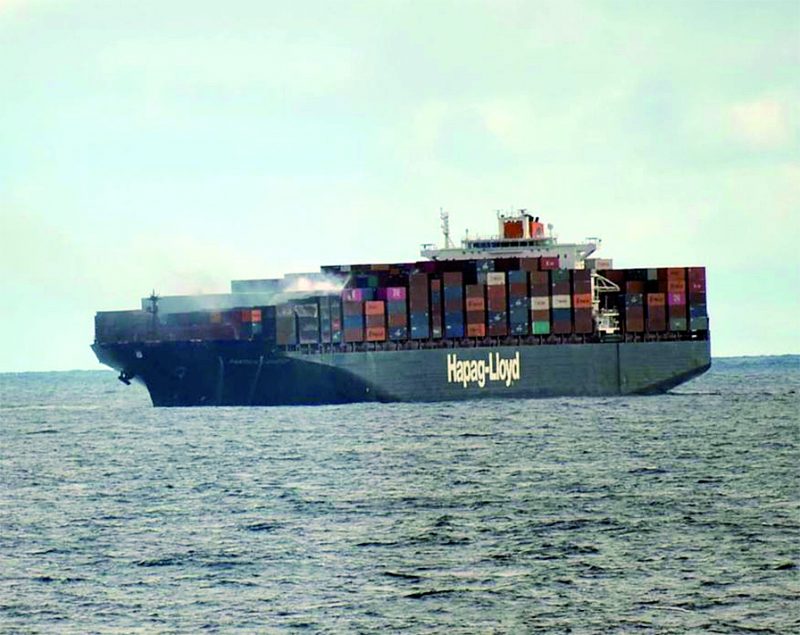
Hapag Lloyd’s 88,493gt/2002 built Yantian Express (above), which suffered a fire on 3rd January, was announced on 25th January as being towed to the Port of Freeport (Bahamas) under the control of Smit salvage. At that time, the ship was 1,250 nautical miles from her destination. Once there, the recovery and assessment efforts of the cargo could proceed. Four tugs are now handling the ship as the 852gt/1976 built Atlantic Enterprise and the 2,263gt/2003 built Boskalis AHTS Sovereign joined the 10,118gt/2018 built Maersk Mobiliser and the 2,606gt/2006 built Smit Nicobar in January.

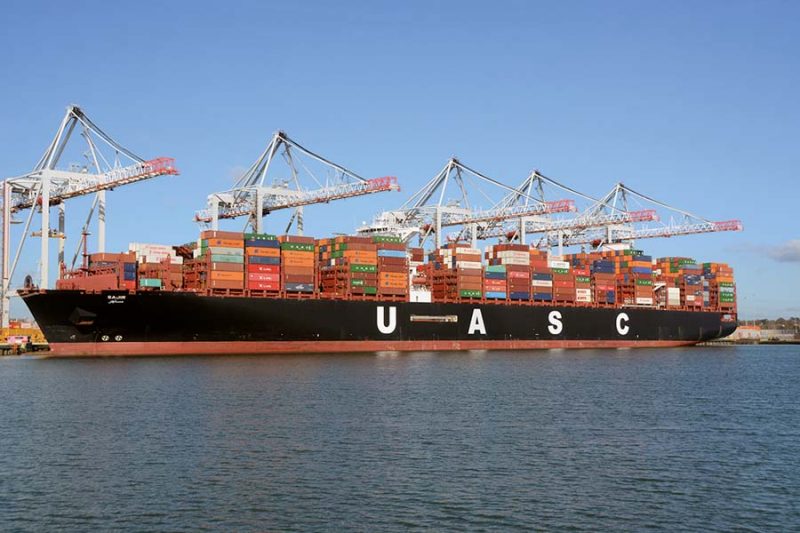
On 5th February Hapag-Lloyd announced a world first project to convert a large container ship to LNG. The 153,148gt/2014 built Sajir (above) will undergo the conversion to permit her to operate on either LNG (primary fuel) or low-sulphur fuel oil (LSFO) as a back-up. The contract for the retrofitting was signed with Hudong HONDHOA Shipbuilding (Group) Co. Ltd. and the work will be carried out in the Shanghai-based shipyard Huarun Dadong Dockyard Co., Ltd. The Sajir is one of the 17 vessels in Hapag-Lloyd’s fleet that were originally designed to be LNG-ready.
MacAndrews, a subsidiary of CMA CGM, is to be merged into the French Operator’s other intra-European subsidiary, Containerships, effective from 1st April. Containerships was acquired by CMA CGM in 2018 whilst MacAndrews was purchased by CMA CGM in 2002 and merged with OPDR in 2018.
Maersk Line confirmed on 14th January that it plans to rebuild the 153,153gt/2017 built Maersk Honam in South Korea following a major fire aboard the ship on 6th March 2018. A portion of the vessel will be transported by heavy-lift vessel to Hyundai Heavy Industries where it will be rebuilt. The ship was cut into two parts at the Drydock World Dubai (UAE) with the undamaged 228.5m long section, from midship to stern, to be shipped aboard the heavy-lift vessel Xin Guan Hua to South Korea, arriving during March 2019. The ship was built at the same yard so a new forward section will be built It is expected to deliver the section at Hyundai Heavy Industries Shipyard in March 2019, the same yard the vessel was built in, where she will be rebuilt with a new forward section. Damaged containers are still being removed from the fire ravaged forward section of the ship and, once complete, this part of the ship will be recycled. All cargo in the ship’s forward holds were declared a total loss, but containers aft of the ship’s superstructure was largely undamaged.
COSCO Zhoushan Shipyard delivered the 3,600 TEU capacity and 34,882gt/2019 built containership Vilnia Maersk in January. The ship is the sixth in a series of seven Baltic feeders for Maersk’s Seago Line brand. The vessels are 200m long with a 35.2m beam and an ice-class hull. In 2018, sistership Venta Maersk became the world’s first commercial containership to venture through the Northern Sea Route. The Maersk Line ship was the second to be delivered this year by the shipyard as they also handed over the crude oil carrier Green Aura on 3rd January.
MSC’s 192,237gt/2015 built MSC Zoe lost a confirmed total of 345 containers into the North Sea at New Year as she headed for Hamburg from Antwerp, more than was originally thought.
Ocean Network Express (ONE) announced on 15th January that, in late December 2018, the 210,678gt/2017 built MOL Trust and MOL Tradition set a loading record of 18,694 TEU and 18,767 TEU respectively. The MOL Trust operates in ONE’s Far East Loop 2 (FE2) service for THE Alliance and achieved the record on her Singapore westbound departure to Northern Europe on 24th December 2018. The MOL Tradition, which operates in the same FE2 service, renewed ONE’s record on her Singapore westbound departure on 29th December 2018. The company’s latest 14,000 TEU capacity ship, the ONE Grus, was delivered by the Japan Marine United Corporation at the Kure Shipyard in January. The 145,647gt/2019 built ship is owned by ONE partner Nippon Yusen Kaisha (NYK) and is ONE’s 5th such newbuild.
Synergy Group took delivery of the 217,762gt/2018 built Ever Gifted, a ULCV newbuilding constructed by Japanese shipbuilder Imabari Shipbuilding, in the New Year. The 20,388 TEU capacity ship joins Evergreen Line’s Far East-North Europe and Mediterranean service. The 199,489dwt ship has an overall length of 399.98m and a beam of 58.8m metres. Fitted with a fuel optimised MAN B&W 11-cylinder G95ME engine, the Ever Gifted offers a service speed of 23.2 knots. On 15th January sistership Ever Grade was delivered.
TS Lines of Taiwan is looking to expand its fleet of wholly-owned ships to support the expansion of its shipping network. The company is looking into ordering ships in a multitude of sizes including 1,000 TEU, 2,000 TEU and 2,800 TEU capacities with the aims of boosting the fleet to 18 vessels. The company’s fleet currently stands at 37 vessels, six of which are owned by TS Lines.
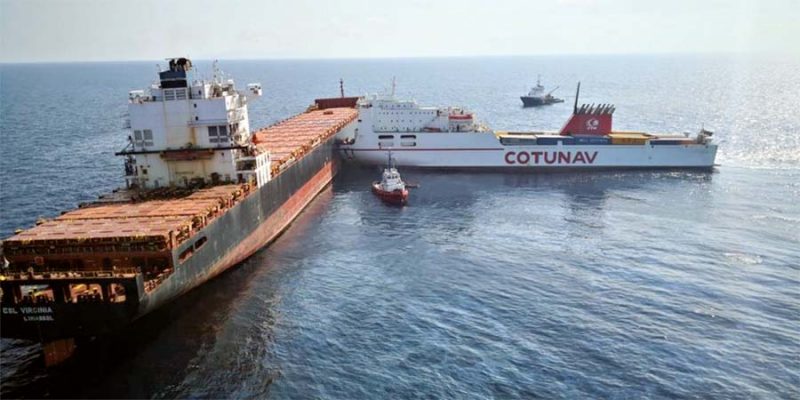
Virgin Maritime SA’s 54,592gt/2005 built containership Virgin Star has been sold for demolition in Bangladesh. The ship, renamed from the CSL Virginia, made headlines on 7th October when she sustained significant hull damage when struck broadside by the Ro-Ro vessel Ulysse (above). The CSL Virginia was anchored at the time, albeit in a shipping lane. The ship, previously owned by Cyprus Sea Lines, was reportedly sold on 21st December 2018.
Yang Ming Marine Transport has exercised an option with Japanese owner Shoei Kisen Kaisha for the charter of an additional four 11,000 TEU capacity newbuilding containerships. The move follows Yang Ming entering into charter agreements for five 12,000 TEU capacity containerships and five 11,000 TEU capacity ships with Costamare and Shoei Kisen Kaisha respectively in July 2018. The vessels are being built at Yangzijiang Shipbuilding and Imabari Shipbuilding. Yang Ming has also approved a plan to charter a further four containerships ranging in capacity from from 9,000 TEU to 11,000 TEU and, in late January, final discussions were still underway.
ZIM and the 2M Alliance (Maersk Line and MSC) have said they will co-operate on four additional services, two on routes between East Asia and the Pacific Northwest and two between ports in Asia and the Mediterranean. The service changes were expected to begin in March, subject to approval by the U.S. Federal Maritime Commission and other regulators. The agreement is described as being a game-changer by ZIM. In the Pacific Northwest, ZIM will contribute four ships of the seven in what is now Maersk’s TP9/MSC’s Maple service. ZIM will call it the ZIM Pacific Pollux (ZP9) service. Currently Maersk operates all seven ships on the line. Part of the ZIM slots on the TP9 will be swapped for access to slots on the fully 2M operated TP8 service.

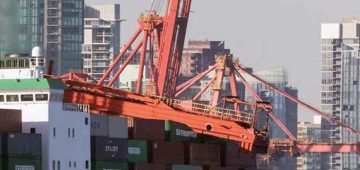



Comments
Sorry, comments are closed for this item